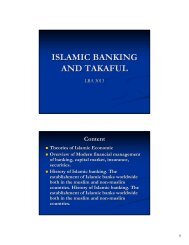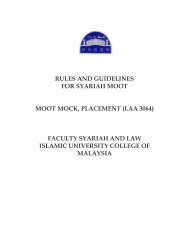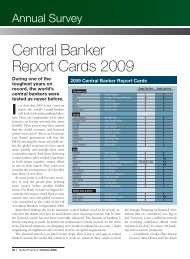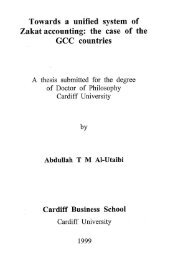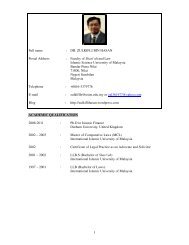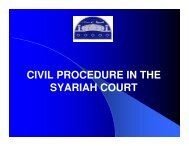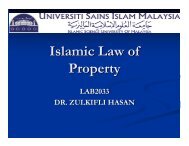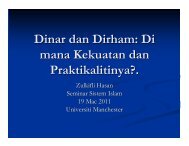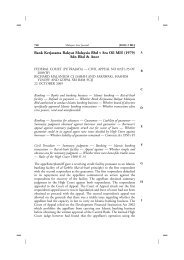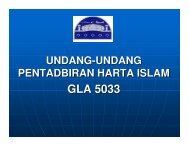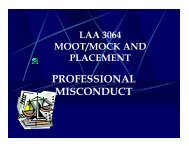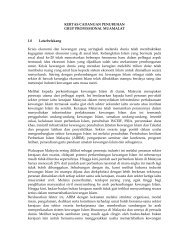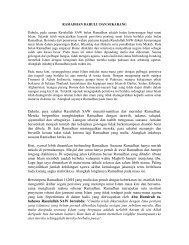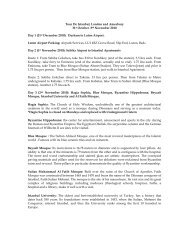Bank Muamalat Malaysia Bhd v Che' Rus bin Husin & Ors [2004] 4 ...
Bank Muamalat Malaysia Bhd v Che' Rus bin Husin & Ors [2004] 4 ...
Bank Muamalat Malaysia Bhd v Che' Rus bin Husin & Ors [2004] 4 ...
Create successful ePaper yourself
Turn your PDF publications into a flip-book with our unique Google optimized e-Paper software.
<strong>Bank</strong> <strong>Muamalat</strong> <strong>Malaysia</strong> <strong>Bhd</strong> v Che’ <strong>Rus</strong> <strong>bin</strong> <strong>Husin</strong> & <strong>Ors</strong><br />
[<strong>2004</strong>] 4 MLJ (Raus J)<br />
67<br />
A<br />
B<br />
<strong>Bank</strong> <strong>Muamalat</strong> <strong>Malaysia</strong> <strong>Bhd</strong> v<br />
Che’ <strong>Rus</strong> <strong>bin</strong> <strong>Husin</strong> & <strong>Ors</strong><br />
HIGH COURT (KUALA LUMPUR) — ORIGINATING MOTION NO R1–25–108<br />
OF 2002<br />
RAUS J<br />
18 MAY <strong>2004</strong><br />
Administrative Law — Remedies — Certiorari — Application for — Whether Industrial<br />
Court erred in law — Whether decision to be quashed<br />
C<br />
D<br />
E<br />
F<br />
G<br />
H<br />
I<br />
Labour Law — Industrial Court — Jurisdiction — Collective agreement — Dispute arising<br />
as to termination of service — Whether could be heard under s 56 of Industrial Relations<br />
Act 1967 — Whether tantamount to error of law — Industrial Relations Act 1967 ss 2, 56<br />
The applicant is the former <strong>Bank</strong> Bumiputra <strong>Malaysia</strong> <strong>Bhd</strong> (‘BBMB’), now<br />
known as the <strong>Bank</strong> <strong>Muamalat</strong> Sdn <strong>Bhd</strong>. In 1999 BBMB mergered with <strong>Bank</strong><br />
of Commerce <strong>Malaysia</strong> <strong>Bhd</strong> (‘BOC’), under an agreement where BBMB<br />
transferred their conventional banking assets to BOC and only maintain the<br />
Islamic banking assets.<br />
Subsequently, BBMB was renamed <strong>Bank</strong> <strong>Muamalat</strong> and BOC became<br />
Bumiputra Commerce <strong>Bank</strong> <strong>Bhd</strong> (‘BCB’). After the merger, BOC offered some<br />
of the employees continuing employment. with BOC. Those who accepted the<br />
offer, brought an action against BBMB after 19 months after their acceptance<br />
of BOC’s offer.<br />
The respondents claimed the following: (i) that BBMB failed to comply<br />
with s 56 of the Industrial Relations Act 1967; (ii) BBMB had not complied<br />
with art 11 of the collective agreement which relates to the requirement of<br />
termination notice by the terminating party; and (iii) that BBMB should have<br />
paid three months salary in lieu of the relevant notice (art 11).<br />
However, the applicant on the other hand disputed that the alleged termination<br />
and claimed that the respondents were the ones who left the employment<br />
by accepting the offers of continued employment in BCB. The Industrial Court<br />
found in favour of the respondents. Hence this application by the applicant<br />
for a certiorari to quash the said award.<br />
Held, allowing the application with costs:<br />
(1) Since there was a clear and fundamental dispute as to whether the<br />
applicant had terminated the respondents’ services, the Industrial Court<br />
had no jurisdiction to hear the trade dispute under s 56. Furthermore,<br />
s 56 of the Act does not empower the Industrial Court to interpret a term<br />
of a collective agreement to determine the scope, nature and intention<br />
of parties in respect of the said terms. However, s 56 is intended by<br />
Parliament to be a summary enforcement procedure for a clear-cut<br />
case of non-compliance of a term of an award or collective agreement.<br />
When the facts are in dispute, such powers could only be exercised under<br />
s 33(2) of the Act (see para 23).
68 Malayan Law Journal [<strong>2004</strong>] 4 MLJ<br />
(2) The Industrial Court had interpreted the scope of art 11 of the collective<br />
agreement between the parties before reaching the conclusion that the<br />
applicant had breached the aforesaid art 11. By doing so, it had therefore<br />
exceeded its jurisdiction (see para 26).<br />
(3) The finding of Industrial Court that the services of the respondents<br />
were terminated by BBMB was not supported by evidence. There was<br />
no evidence that BBMB had ever issued any letters of termination to<br />
any of the respondents when the merger between BBMB and BOC<br />
took place. The offer to the respondents for continued employment came<br />
from BOC. Nevertheless, a meeting was held between KEPAK (trade<br />
union representing the employees) and BBMB and an agreement was<br />
reached whereby BOC on the same date issued a letter to provide<br />
clarification on the original offer letter. The offers were accepted by the<br />
respondents (see para 30).<br />
(4) No evidence was placed before the Industrial Court to support the<br />
conclusion that BBMB had terminated the services of the respondents.<br />
The action of the respondents claiming three months salary in lieu of<br />
notice was done not in good faith. This was because they had accepted<br />
the offers of continued employment, after negotiating a settlement with<br />
BBMB and BOC and became the employees of BOC on exactly the<br />
same terms and conditions of employment enjoyed by them with BBMB.<br />
To complain now, some 19 months after accepting the offers of continued<br />
employment by BOC, that the applicant did not give them the required<br />
three month’s notice and thus seeking compensation in lieu thereof,<br />
was clearly an act in bad faith on the part of the respondents (see para 31).<br />
A<br />
B<br />
C<br />
D<br />
E<br />
[Bahasa <strong>Malaysia</strong> summary<br />
Pemohon dahulunya adalah <strong>Bank</strong> Bumiputra <strong>Malaysia</strong> <strong>Bhd</strong> (‘BBMB’), kini<br />
dikenali sebagai <strong>Bank</strong> <strong>Muamalat</strong> Sdn <strong>Bhd</strong>. Pada tahun 1999, BBMB telah<br />
bergabung dengan <strong>Bank</strong> of Commerce <strong>Malaysia</strong> <strong>Bhd</strong> (‘BOC’), dalam suatu<br />
perjanjian di mana BBMB memindahkan aktiviti aset perbankan konvensional<br />
kepada BOC dan hanya mengekalkan aset perbankan Islam.<br />
Selepas itu, BBMB ditukarkan nama kepada <strong>Bank</strong> <strong>Muamalat</strong> dan BOC menjadi<br />
Bumiputra Commerce <strong>Bank</strong> <strong>Bhd</strong> (‘BCB’). BOC menawarkan beberapa pekerja<br />
untuk terus bekerja dengan BOC selepas penggabungan tersebut. Mereka<br />
yang menerima tawaran tersebut mengambil tindakan guaman terhadap<br />
BBMB selepas 19 bulan tawaran tersebut diterima.<br />
Pihak responden menuntut yang berikut: (i) bahawa BBMB gagal mematuhi<br />
s 56 Akta Perhubungan Perusahaan 1967; (ii) BBMB gagal mematuhi<br />
perkara 11 kepada perjanjian kolektif yang berkaitan dengan notis penamatan<br />
oleh pihak yang menamatkan servis; dan (iii) BBMB seharusnya membayar<br />
gaji untuk tiga bulan sebagai ganti notis berkenaan (perkara 11).<br />
Pemohon pula menyangkal penamatan kerja tersebut dan mengadu bahawa<br />
pihak respondenlah yang telah meninggalkan kerja mereka selepas menerima<br />
F<br />
G<br />
H<br />
I
<strong>Bank</strong> <strong>Muamalat</strong> <strong>Malaysia</strong> <strong>Bhd</strong> v Che’ <strong>Rus</strong> <strong>bin</strong> <strong>Husin</strong> & <strong>Ors</strong><br />
[<strong>2004</strong>] 4 MLJ (Raus J)<br />
69<br />
A<br />
tawaran pekerjaan dalam BCB. Mahkamah perusahaan memihak kepada<br />
kepada responden. Maka, permohonan ini dimajukan oleh pemohon untuk<br />
perintah certiorari membatalkan award tersebut.<br />
B<br />
C<br />
D<br />
E<br />
F<br />
G<br />
H<br />
Diputuskan, membenarkan permohonan dengan kos:<br />
(1) Oleh kerana terdapat pertikaian yang asasi dan jelas berkaitan dengan<br />
isu sama ada pemohon telah menamatkan servis responden, mahkamah<br />
perusahaan tidak mempunyai bidang kuasa untuk membicarakan pertikaian<br />
perusahaan tersebut di bawah s 56. Lagipun, s 56 Akta berkenaan tidak<br />
memberi kuasa kepada mahkamah perusahaan untuk mentafsir terma<br />
perjanjian kolektif untuk menentukan skop, sifat dan keinginan pihak<br />
dalam terma tersebut. Walau bagaimanapun s 56 adalah diinginkan oleh<br />
Parlimen untuk dijadikan prosedur penguatkuasaan terus untuk kes<br />
yang jelas tidak mematuhi terma award atau perjanjian kolektif. Bila,<br />
fakta dipertikaikan, kuasa tersebut hanya boleh digunakan di bawah<br />
s33(2) Akta tersebut (lihat perenggan 23).<br />
(2) Mahkamah perusahaan telah mentafsirkan skop artikel 11 yang terkandung<br />
dalam perjanjian kolektif di antara pihak berkenaan sebelum membuat<br />
keputusan bahawa pemohon telah mungkir artikel 11. Dengan membuat<br />
demikian, mahkamah perusahaan telah melampaui bidang kuasanya<br />
(lihat perenggan 26).<br />
(3) Keputusan mahkamah perusahaan bahawa servis responden-responden<br />
telah ditamatkan oleh BBMB tidak disokong oleh keterangan. Tiada<br />
bukti wujud bahawa BBMB telah memberikan surat penamatan kepada<br />
responden-responden apabila penggabungan di antara BBMB dan BOC<br />
berlaku. Walau bagaimanapun, mesyuarat di antara KEPAK (kesatuan<br />
sekerja yang mewakili pekerja-pekerja) dan BBMB telah berjaya<br />
mewujudkan satu perjanjian di mana BOC pada hari yang sama<br />
memberikan surat untuk menjelaskan surat tawaran asal. Tawaran<br />
tersebut diterima oleh pihak responden (lihat perenggan 30).<br />
(4) Tiada sebarang keterangan yang diberikan kepada Mahkamah Perusahaan<br />
untuk menyokong bahawa BBMB menamatkan servis responden. Aksi<br />
responden menuntut tiga bulan gaji sebagai ganti notis tidak dibuat<br />
dengan suci hati. Ini kerana mereka telah menerima tawaran untuk<br />
meneruskan kerja selepas merunding suatu penyelesaian dengan BBMB<br />
dan BOC dan menjadi pekerja di BOC di atas terma dan syarat yang<br />
sama dengan BBMB. Maka, untuk membuat aduan selepas 19 bulan<br />
selepas menerima tawaran tersebut bahawa pemohon tidak memberi<br />
tiga bulan notis atau pampasan adalah jelas dilakukan dengan niat<br />
jahat oleh pihak responden (lihat perenggan 31).]<br />
I<br />
Notes<br />
For cases on certiorari, see 1 Mallal’s Digest (4 th Ed, 2002 Reissue) paras<br />
165–173.
70 Malayan Law Journal [<strong>2004</strong>] 4 MLJ<br />
For cases on jurisdiction of the Industrial Court, see 8(1) Mallal’s Digest<br />
(4 th Ed, 2003 Reissue) paras 1323–1375.<br />
For certiorari generally, see 9 Halsbury’s Laws of <strong>Malaysia</strong> paras [160.117]–<br />
[160.129].<br />
For jurisdiction of the Industrial Court, see 7 Halsbury’s Laws of <strong>Malaysia</strong><br />
para [120.1060].<br />
Cases referred to<br />
All Malayan Estates Staff Union v Benta Plantations <strong>Bhd</strong> Sabai Estate, Karak,<br />
Pahang [1981] 1 MLLR 634 (refd)<br />
Dragon Phoenix <strong>Bhd</strong> v Kesatuan Pekerja-pekerja Perusahaan Membuat Tekstil<br />
dan Pakaian Pulau Pinang & Anor [1991] 1 MLJ 89 (refd)<br />
Dunlop Industries Employees Union v Dunlop <strong>Malaysia</strong>n Industries <strong>Bhd</strong> & Anor<br />
[1987] 2 MLJ 81 (refd)<br />
Goh & Dom Enterprise Sdn <strong>Bhd</strong> v Union of Employees of Port Ancillary Services<br />
Supplier P Klang [1987] 1 ILR 338 (refd)<br />
Guardian Royal Exchange Assurance (M) <strong>Bhd</strong> v National Union of Commercial<br />
Workers & Anor [2000] 7 MLJ 503 (refd)<br />
Holiday Inn, Kuala Lumpur v National Union of Hotel, Bar and Restaurant Workers<br />
[1998] 1 MLJ 306 (refd)<br />
PSC-Naval Dockyard Sdn <strong>Bhd</strong> v Kesatuan Pekerja-pekerja Naval Dockyard<br />
Sdn <strong>Bhd</strong> & Anor [2002] 2 CLJ 364 (refd)<br />
Syarikat Kenderaan Melayu Kelantan <strong>Bhd</strong> v Transport Workers’ Union [1995]<br />
2 MLJ 317 (refd)<br />
A<br />
B<br />
C<br />
D<br />
E<br />
Legislation referred to<br />
Companies Ordinance 1940 s 15(1)<br />
Industrial Relations Act 1967 ss 2, 33(2), 56<br />
N Sivabalah (Raymond TC Low with him) (Shearn Delamore & Co) for the<br />
appellant.<br />
P Vickneswaran (G Kavitha with him) (Murugavell Arumugam & Co) for the<br />
respondent.<br />
F<br />
G<br />
Raus J:<br />
APPLICATION<br />
[1] This is an application by the applicant for an order of certiorari to<br />
quash the decision of the Industrial Court in Award No 710 of 2002 handed<br />
down on 22 August 2002. In the said award, the Industrial Court ruled that<br />
there was non-compliance of art 11 of the collective agreement in respect of<br />
the applicant’s failure to provide the respondents the requisite three months<br />
notice of termination. Consequently, the Industrial Court ordered the applicant<br />
to compute the moneys and pay the same to the respondents within one month<br />
from the service of the award.<br />
H<br />
I
<strong>Bank</strong> <strong>Muamalat</strong> <strong>Malaysia</strong> <strong>Bhd</strong> v Che’ <strong>Rus</strong> <strong>bin</strong> <strong>Husin</strong> & <strong>Ors</strong><br />
[<strong>2004</strong>] 4 MLJ (Raus J)<br />
71<br />
A<br />
FACTS<br />
[2] The following are the relevant facts in relation to the applicant’s<br />
application.<br />
B<br />
C<br />
D<br />
E<br />
F<br />
G<br />
H<br />
I<br />
[3] The applicant is an entity formerly known as <strong>Bank</strong> Bumiputra <strong>Malaysia</strong><br />
<strong>Bhd</strong> (‘BBMB’). BBMB was incorporated under s 15(1) of the Companies<br />
Ordinance 1940 and commenced business as <strong>Bank</strong> Bumiputra <strong>Malaysia</strong> Ltd<br />
on 1 October 1965. On 24 January 1968, its name was changed to BBMB.<br />
[4] In 1999, BBMB underwent a merger exercise with another legal entity<br />
known as <strong>Bank</strong> of Commerce <strong>Malaysia</strong> <strong>Bhd</strong> (‘BOC’). Before the merger,<br />
both BBMB and BOC were carrying out conventional and Islamic banking<br />
activities. Under the merger, the conventional banking assets of BBMB were<br />
transferred to BOC and BBMB took over the Islamic banking assets of BOC.<br />
The ultimate result of this merger was that BBMB conducted solely Islamic<br />
banking whereas BOC conducted solely conventional banking business.<br />
Subsequent to the merger exercise, BBMB was renamed as <strong>Bank</strong> <strong>Muamalat</strong><br />
<strong>Malaysia</strong> <strong>Bhd</strong> (‘<strong>Bank</strong> <strong>Muamalat</strong>’) and BOC was renamed as Bumiputra<br />
Commerce <strong>Bank</strong> <strong>Bhd</strong> (‘BCB’).<br />
[5] Prior to the merger exercise, BBMB on 17 September 1998 had entered<br />
into a memorandum of understanding with Commerce Asset Holding <strong>Bhd</strong>,<br />
the holding company of BOC to facilitate the merger of BBMB and BOC.<br />
Pursuant to the execution of the memorandum of understanding, BBMB<br />
and BOC entered into an asset transfer agreement to facilitate the merger.<br />
[6] On 3 September, 1999, the High Court of Malaya in Kuala Lumpur<br />
granted a vesting order to enable the implementation of the asset transfer<br />
agreement and merger with effect from 30 September 1999. Under the vesting<br />
order, all liabilities of BBMB were vested in BOC.<br />
[7] Prior to the completion of the said merger, BOC made offers of continued<br />
employment to the employees of BBMB through a letter dated 18 August<br />
1999. Under the said letter, BOC informed the employees of BBMB about<br />
the transfer of business of BBMB to BOC with effect from 30 September 1999<br />
and in view of that, BOC was offering them continued employment with effect<br />
from 1 October, 1999 on exactly the same terms and conditions of employment<br />
enjoyed by them in BBMB. The letter also stated that should BOC fail to<br />
hear from the employees by 1 September 1999, it would presume that the<br />
employees are not accepting the BOC offer for continued employment.<br />
[8] Further, by a letter dated 24 August 1999, the employees of BBMB<br />
were informed by BBMB that in view of the offers of employment and merger,<br />
BBMB had waived the employees’ requirement to provide BBMB with notice<br />
or salary in lieu thereof.<br />
[9] With regard to the offer of continued employment by BOC, the trade<br />
union representing the employees of BBMB, namely KEPAK raised various<br />
grievances with BOC. As a result, the offer of employment by BOC was not<br />
accepted within the time stipulated in the aforesaid letter of offer.
72 Malayan Law Journal [<strong>2004</strong>] 4 MLJ<br />
[10] Thereafter, BBMB met with the officials of KEPAK to resolve all matters<br />
pertaining the offer of continued employment. An agreement was reached on<br />
2 September 1999 pursuant to which, BOC issued a letter to the same to<br />
provide various clarification of the original offer letter dated 18 August 1999.<br />
The content of the aforesaid letter, in substance, contained the details of the<br />
agreement reached between BBMB and KEPAK. In substance, it provides<br />
that the terms and conditions of BBMB employees’ employment shall be no<br />
less favourable than the terms and conditions set out in the collective agreement<br />
between BBMB and KEPAK for the period from 20 June 1998 to 19 June 2001.<br />
[11] Pursuant to the letter of 2 September 1999, majority of the employees<br />
of BBMB accepted the offers of continued employment from BOC. Those<br />
who accepted the aforesaid offer became the employees of BCB. There were,<br />
however, some employees who did not accept the offers of continued<br />
employment by BOC. These employees remained in the service of BBMB<br />
which was later renamed as <strong>Bank</strong> <strong>Muamalat</strong>. For these employees, where<br />
no position was available in the applicant’s service, they became redundant<br />
to the requirement of the applicant and were duly retrenched. They were given<br />
the necessary notice of termination and paid the retrenchment benefits.<br />
[12] The respondent in this present action were former employees of BBMB<br />
who accepted the offers of continued employment with BOC. They, on<br />
21May, 2002 some 19 months later after their acceptance of BOC’s offer<br />
letters, filed a complaint of non-compliance under s 56 of the Industrial<br />
Relations Act 1967 (‘the Act’). Their complaints alleged that BBMB had not<br />
complied with art 11 of collective agreement which relate to the requirement<br />
to provide a notice of termination by the party who is terminating the contact<br />
of employment.<br />
[13] The gist of the respondents’ complaint was that the action of BBMB<br />
amounted to a termination of employment of the respondent and therefore,<br />
they should be paid three months salary in lieu as per art 11.1 of the collective<br />
agreement.<br />
[14] The applicant, on the other hand, disputed the alleged termination<br />
of the respondents and contended that it was the respondents instead who<br />
left the employment of BBMB to accept the offers of continued employment<br />
with BCB. The stand taken by the applicant was that there were never any<br />
act which amount to a non-compliance of art 11 of the collective agreement.<br />
[15] The Industrial Court found in favour of the respondents. Hence, the<br />
applicant is now challenging the award.<br />
A<br />
B<br />
C<br />
D<br />
E<br />
F<br />
G<br />
H<br />
GROUNDS OF APPLICATION<br />
[16] The applicant has based his application on the following grounds:<br />
(1) The Industrial Court exceeds its jurisdiction in proceeding to hear the<br />
dispute under s 56 of the Act, notwithstanding the fact that there were<br />
serious and fundamental disputes of fact.<br />
I
<strong>Bank</strong> <strong>Muamalat</strong> <strong>Malaysia</strong> <strong>Bhd</strong> v Che’ <strong>Rus</strong> <strong>bin</strong> <strong>Husin</strong> & <strong>Ors</strong><br />
[<strong>2004</strong>] 4 MLJ (Raus J)<br />
73<br />
A<br />
B<br />
C<br />
D<br />
E<br />
F<br />
G<br />
H<br />
I<br />
(2) The Industrial Court acted in excess of its jurisdiction under s 56 of the<br />
Act where it interpreted art 11 of the collective agreement.<br />
(3) The Industrial Court arrived at a perverse finding in holding that the<br />
services of the respondents were terminated by BBMB.<br />
(4) The Industrial Court committed jurisdictional errors when it acted outside<br />
the scope of the pleadings and on an incorrect basis of fact.<br />
(5) Failure to join BOC as a party represents a breach of the rules of natural<br />
justice.<br />
FINDINGS<br />
[17] The respondents in their application under s 56 of the Act, alleged<br />
that the applicant had failed to comply with art 11 of the collective agreement<br />
art 11 of the collective agreement reads as follows:<br />
Article 11: Termination of Employment<br />
11.1Other than in cases of termination arising out of or in connection with misconduct<br />
or during the probationary period of office, the <strong>Bank</strong> or an officer may terminate<br />
the employment of the officer by giving three (3) months’ notice to the other party<br />
or by paying the other party three months’ salary in lieu of such notice.<br />
11.2For the purpose of calculation of indemnity, one (1) month is considered as<br />
consisting 30 days.<br />
11.3The effective date of the notice given by either party shall be the date of receipt<br />
of the notice.<br />
[18] It is the submission of the applicant that under s 56 complaint, the<br />
legal burden rests on the respondents to prove two essential matters. Firstly,<br />
it was incumbent upon the respondents to prove that they were entitled to<br />
a right or benefit (in this case, notice of termination or salary in lieu of notice)<br />
under a term of collective agreement. The right to such notice would only<br />
arise if they can establish that their services were being terminated by the<br />
applicant. Secondly, they had to prove that the applicant had failed to comply<br />
with the said terms. It is further submitted that s 56 of the Act cannot be<br />
invoked in a case where there is a serious disputes and fundamental dispute<br />
of facts that forms the crux of the allegation or non-compliance. In short,<br />
according to the applicant where there is a dispute on the facts leading to<br />
the alleged act of non-compliance, s 56 cannot be invoked. This is because<br />
s 56 is intended by Parliament to be a summary enforcement procedure for<br />
clear-cut cases of non-compliance of a term of an award or collective agreement.<br />
To support the applicant’s contention, learned counsel for the applicant referred<br />
to the following cases: Holiday Inn, Kuala Lumpur v National Union of Hotel,<br />
Bar and Restaurant Workers [1998] 1 MLJ 306; Dunlop Industries Employees<br />
Union v Dunlop <strong>Malaysia</strong>n Industries <strong>Bhd</strong> & Anor [1987] 2 MLJ 81; Guardian<br />
Royal Exchange Assurance (M) <strong>Bhd</strong> v National Union of Commercial Workers<br />
& Anor [2000] 7 MLJ 503; PSC-Naval Dockyard Sdn <strong>Bhd</strong> v Kesatuan Pekerja-<br />
Pekerja Naval Dockyard Sdn <strong>Bhd</strong> & Anor [2002] 2 CLJ 364; All Malayan
74 Malayan Law Journal [<strong>2004</strong>] 4 MLJ<br />
Estates Staff Union v Benta Plantations <strong>Bhd</strong> Sabai Estate, Karak, Pahang [1981]<br />
1 MLLR 634, and Goh & Dom Enterprise Sdn <strong>Bhd</strong> v Union of Employees of Port<br />
Ancillary Services Supplier P Klang [1987] 1 ILR 338.<br />
[19] The respondents in rebuttal, did not dispute the authorities cited by<br />
the learned counsel for the applicant on the course of action applicable if<br />
indeed the material facts in the present case were in serious dispute. But, it<br />
is submitted for the respondents that the material facts of this case is not in<br />
serious dispute. According to learned counsel for the respondents, all that was<br />
contended by the applicant before the Industrial Court was that the applicant<br />
did not terminate the services of the respondents because no letter of termination<br />
was ever issued to the respondents and they did not admit to non-compliance<br />
to art 11 of the said collective agreement. According to learned counsel, a mere<br />
contention of the aforesaid by the applicant does not ipso facts mean there<br />
is a serious dispute of facts. In support of the respondents’ contention, the<br />
learned counsel referred this court to the Court of Appeal’s decision of Syarikat<br />
Kenderaan Melayu Kelantan Berhad v Transport Workers’ Union [1995] 2 MLJ 317.<br />
[20] Thus, there is a consensus of opinion that s 56 of the Act does not<br />
empower the Industrial Court to address a trade dispute. But the question<br />
in the present case is, was there a trade dispute<br />
[21] Section 2 of the Act define ‘trade dispute’ as follows:<br />
‘Trade dispute’ means any dispute between an employer and his workmen which<br />
is connected with the employment or non-employment or the terms of employment<br />
or the condition of work of any such workmen.<br />
[22] In light of the definition of trade dispute above, and on the facts of this<br />
case, I am of the view that the issue of alleged termination of the respondents<br />
by BBMB was a trade dispute The Industrial Court itself acknowledged not<br />
only that there was a trade dispute, there was also a serious dispute of facts.<br />
In the body of the award, the learned Chairman said:<br />
In this case, notwithstanding the serious dispute by both parties on whether there is a<br />
termination of employment by BBMB or by the complainant, the court is satisfied that<br />
the complainant had been able to establish that due to the merger, BBMB could<br />
no longer employ them and had therefore enable the complainant to take up the<br />
offers of continued employment with BOC ...<br />
[23] Thus, I am of the view, since there was a clear and fundamental dispute<br />
on whether the applicant had terminated the respondents’ services, the Industrial<br />
Court had no jurisdiction to hear and address the trade dispute of such nature<br />
in the complaint of non-compliance under s 56. To me, s 56 of the Act does<br />
not empower the Industrial Court to interpret a term of a collective agreement<br />
to determine the scope, nature and intention of parties in respect of the said<br />
terms. Section 56 is intended by Parliament to be a summary enforcement<br />
procedure for clear-cut cases of non-compliance of a term of an award or<br />
collective agreement. When the facts are in dispute, such powers can only<br />
be exercised under s 33(2) of the Act.<br />
A<br />
B<br />
C<br />
D<br />
E<br />
F<br />
G<br />
H<br />
I
<strong>Bank</strong> <strong>Muamalat</strong> <strong>Malaysia</strong> <strong>Bhd</strong> v Che’ <strong>Rus</strong> <strong>bin</strong> <strong>Husin</strong> & <strong>Ors</strong><br />
[<strong>2004</strong>] 4 MLJ (Raus J)<br />
75<br />
A<br />
B<br />
[24] In the present case, it is clear that the Industrial Court had entered<br />
into a detailed interpretation of art 11 of the collective agreement as a precursor<br />
to the order of compliance against the applicant. This is evident when the<br />
Industrial Court ruled at p 10 of the award:<br />
The Court is of the view that since neither Article 11 nor the provision of the CA<br />
(collective agreement) provide for waiver of notice of termination, the question of<br />
waiver by BBMB should not arise.<br />
[25] Further at p 12 of the award, the Industrial Court ruled that:<br />
C<br />
D<br />
E<br />
F<br />
G<br />
H<br />
I<br />
It is clear that Article 11 of the CA <strong>bin</strong>ds the Union and BBMB. Nowhere it is<br />
provided that it <strong>bin</strong>ds BOC instead of BBMB. The CA should be <strong>bin</strong>ding on BBMB<br />
notwithstanding the merger with BOC. The vesting order must be construed and<br />
given effect alongside with BBMB’s allegations under the CA. The vesting order<br />
cannot abrogate the right and obligations of the combating parties under the CA,<br />
in particular, Article 11.<br />
[26] To me, the above findings clearly shows, the Industrial Court had<br />
proceeded to interpret the scope of art 11 of the collective agreement between<br />
the parties before reaching the conclusion that the applicant had breached<br />
the aforesaid art 11. By doing so, the Industrial Court had therefore, exceeded<br />
its jurisdiction.<br />
[27] I am fully aware of the ‘permissible overlap’ doctrine propounded by<br />
the Court of Appeal in Syarikat Kenderaan Melayu Kelantan <strong>Bhd</strong> where Gopal<br />
Sri Ram JCA put the matter succinctly as follows (at p 351):<br />
The dissenting judgement of Wan Sulaiman SCJ in Holiday Inn, Kuala Lumpur v<br />
National Union of Hotel, Bar and Restaurant Workers [1988] 1 MLJ 306 correctly<br />
recognizes that s 33(1) and 56 cannot be treated as being housed in watertight<br />
compartments with no permissible overlap under any circumstances. The power of<br />
the court to interpret an award or a collective agreement which has been taken<br />
cognisance of cannot, to borrow the more descriptive language of Macbeth, be ‘ca<strong>bin</strong>’d,<br />
cribb’d and confined.<br />
Accordingly, in my judgement, the question whether the court, when entertaining<br />
a complaint under s 56(1) of the Act has indeed acted in excess of its jurisdiction by<br />
exercising its powers under s 33(1) is one that depends upon the peculiar circumstances<br />
of a particular case.<br />
There may be circumstances, such as those as existed in Federal Hotel Sdn <strong>Bhd</strong> v<br />
National Union of Hotel, Bar & Restaurant Workers [1983] 1 MLJ 175 which may<br />
warrant a superior court forming the view that an error of law has been occasioned<br />
by the court’s unwarranted transgression of the power of in interpretation when<br />
exercising its power of enforcement. On the other end of the scale, there may be cases<br />
in which an interpretation of an award or collective agreement is a sine qua non to<br />
ascertain whether there has indeed been non-compliance of the same. To say in such<br />
circumstance the complaint is to be summarily driven away from the judgment seat<br />
because a question of interpretation has arisen, is to nullify legislative intent, namely,<br />
the expeditious settlement of individual disputes. It follows, therefore, that the extreme<br />
properties that the court, when considering a complaint under s 56(1), may never<br />
interpret an award or collective agreement any circumstances is fallacious and not<br />
worthy of a second glance.
76 Malayan Law Journal [<strong>2004</strong>] 4 MLJ<br />
[28] No doubt I am bound by the said decision, but I am also unable to<br />
ignore the two decisions of the Supreme Court in Holiday Inn and Dragon<br />
Phoenix <strong>Bhd</strong> v Kesatuan Pekerja-Pekerja Perusahaan Membuat Tekstil dan Pakaian<br />
Pulau Pinang & Anor [1991] 1 MLJ 89. In the Holiday Inn’s case Seah SCJ<br />
held as follows (at p 311):<br />
Now, s 56 is concerned with the enforcement in a summary manner of an award by<br />
the Industrial Court or of a collective agreement which has been taken cognisance of<br />
by the court under s 17 after a complaint has been lodged as its non- compliance.<br />
The non-compliance of a term of the award or collective agreement must exist as<br />
an antecedent fact before the Industrial Court can exercise its powers contained<br />
in sub section (2) thereof. It is, therefore, a condition precedent to the exercise of<br />
these powers and there should be in existence a break or non observant of a term<br />
of the award or collective agreement. This must be satisfactory established by the<br />
complainant.<br />
A<br />
B<br />
C<br />
[29] In Dragon Phoenix <strong>Bhd</strong>, Harun Hashim SCJ said at p 90:<br />
In a complaint of non-compliance with any term of a collective agreement or<br />
award under s 56 of the Industrial Relations Act 1967, the Industrial Court …<br />
should not embark on an expedition to examine the provision of the Employment<br />
Act 1955 or order to determine the meaning of the term complained of unless there<br />
is a specific reference to it because to do so would involve the interpretation function<br />
of the court under s 35 of the Industrial Relations Act 1967 which is entirely different<br />
exercise from that under s 56.<br />
[30] From the above authorities, it is clear to me s 56 is intended to be a<br />
summary enforcement procedure for a clear cut case of non-compliance. This<br />
is not the situation in the present case. In the present case, there is a dispute<br />
whether the services of the respondents were terminated by BBMB. I am of<br />
the view, on the facts of this case, the finding of Industrial Court that the<br />
services of the respondents were terminated by BBMB is perverse and not<br />
supported by evidence. There is no evidence that BBMB had ever issued any<br />
letters of termination to any of the respondents when the merger between<br />
BBMB and BOC took place. The offer to the respondents for continued<br />
employment came from BOC. Nevertheless, a meeting was held between<br />
KEPAK and BBMB to resolve whatever ambiguities relating to the offer of<br />
continued employment of the respondents by BOC. An agreement was<br />
reached on 2 September 1999 and BOC then on the same date issued a letter<br />
to provide clarification on the original offer letter. The offers were accepted<br />
by the respondents.<br />
[31] It is clear to me that there is no evidence placed before the Industrial<br />
Court to support the court’s conclusion that BBMB had terminated the<br />
services of the respondents. To me, the action of the respondents claiming three<br />
months salary in lieu of notice was done not in good faith. This is because<br />
they had accepted the offers of continued employment, after negotiating a<br />
settlement with BBMB and BOC and became the employees of BOC on<br />
exactly the same terms and conditions of employment enjoyed by them with<br />
BBMB, To complain now, that is some 19 months after accepting the offers<br />
of continued employment by BOC, that the applicant did not give them the<br />
D<br />
E<br />
F<br />
G<br />
H<br />
I
<strong>Bank</strong> <strong>Muamalat</strong> <strong>Malaysia</strong> <strong>Bhd</strong> v Che’ <strong>Rus</strong> <strong>bin</strong> <strong>Husin</strong> & <strong>Ors</strong><br />
[<strong>2004</strong>] 4 MLJ (Raus J)<br />
77<br />
A<br />
B<br />
required three months’ notice and thus seeking compensation in lieu thereof,<br />
is clearly an act in bad faith on the part of the respondents. Thus, I am not<br />
persuaded to find in favour of the respondents.<br />
[32] In conclusion, I am of the view the finding of the Industrial Court that<br />
BBMB had terminated the services of the respondent is perverse and represent<br />
an error of law. Accordingly, the applicants’ application is allowed with costs.<br />
Application allowed with costs.<br />
Reported by Jeyanthi Mala<br />
C<br />
_____________________<br />
D<br />
E<br />
F<br />
G<br />
H<br />
I


![Bank Muamalat Malaysia Bhd v Che' Rus bin Husin & Ors [2004] 4 ...](https://img.yumpu.com/34972345/1/500x640/bank-muamalat-malaysia-bhd-v-che-rus-bin-husin-amp-ors-2004-4-.jpg)
